READER COMMENTS ON
"My Dinner with Feingold"
(87 Responses so far...)
COMMENT #1 [Permalink]
...
Blue Shark
said on 4/23/2006 @ 5:36 pm PT...
Dear Brad
...I am so pleased you had a chance to speak one on one with perhaps the next president of the United States.
...Were you able to get through to him about electoral fraud? Please tell me you he gave you more than lip service, the glad hand, and the brush-off.
...If Russ Feingold loses in the early morning hours of election day 2008 following a late night computer crash where he went into the night five points up only to have the networks call that he actually lost after some late and unusual numbers came in from Ohio and Florida I am going to do something very...well extreme.
...I have had it with Dem Leaders who just won't learn.
COMMENT #2 [Permalink]
...
Nictuku
said on 4/23/2006 @ 5:45 pm PT...
Great report Brad!
My own personal 'Dream Ticket' for '08 is Gore/Feingold with Wes Clark as Secretary of Defense.
I hope that Russ (and Gore for that matter), open their minds and study the facts about our Electorial Disfunction.
Keep up the good work!
COMMENT #3 [Permalink]
...
Brad
said on 4/23/2006 @ 5:55 pm PT...
Blue Shark - Read the full report if you didn't already. I believe he was quite receptive to the idea of learning what's going on. We'll see whether or not it was "lip service" as you suggest. I didn't get that sense, and he's one of the few folks I'm stilling willing to give the benefit of the doubt 
Nictuku - I like your ticket! Count me in!
COMMENT #4 [Permalink]
...
Truth Seeker
said on 4/23/2006 @ 6:13 pm PT...
If I could chose anyone for President in 2008, it would be Feingold. Who is better?
Nictuku, remember that Gore chose Lieberman as a running mate. I think Feingold can do better than that. However, I like Clark for SOD.
COMMENT #5 [Permalink]
...
agent99
said on 4/23/2006 @ 6:18 pm PT...
Naw. I don't think merely being a good senator is enough to make you president material. My dream ticket:
Gore/Edwards
Clark Secretary of Defense
Feingold Attorney General
Kucinich Secretary of State
COMMENT #6 [Permalink]
...
neil
said on 4/23/2006 @ 6:23 pm PT...
Brad,
I think you could have prepared better questions to ask Senator Feingold in advance.
Neil
COMMENT #7 [Permalink]
...
Nictuku
said on 4/23/2006 @ 6:26 pm PT...
Good point Truth Seeker.
I'm into saving the natural state of our earth, so Gore's recent history has a strong chord with me.
I'll agree that a man with a backbone, and conviction, like Feingold, is just what this country needs. Leadership.
Peace (Maluhia)
COMMENT #8 [Permalink]
...
juju
said on 4/23/2006 @ 6:34 pm PT...
COMMENT #9 [Permalink]
...
bvac
said on 4/23/2006 @ 6:50 pm PT...
Feingold/Friedman '08!
Clark can't be SecDef, until he's been a civilian for 10 years. Maybe Murtha would make a good one. A bit hawkish, but at least sane and reasonable.
COMMENT #10 [Permalink]
...
Jon
said on 4/23/2006 @ 7:16 pm PT...
kucinich for secretary of defense peace!
COMMENT #11 [Permalink]
...
Stop War
said on 4/23/2006 @ 7:39 pm PT...
Brad - thank you again - aweseome.
This is what it takes, getting the one on one, and thank you for sharing with us.
Feingold has backbone, that is what the democratic party is suppose to be, and we need to wead out the weaklings that are just poodles to the regime.
If you notice, I think it is going to take alot of work with the good senators and good congressmen up close and personal to educate them on election issues.
But right now, we need to impeach Bush and Cheney, I am afraid that trumps everything else.
Great job, and keep up the good work.
COMMENT #12 [Permalink]
...
We Count.
said on 4/23/2006 @ 8:15 pm PT...
Brad, I think you chose two EXCELLENT questions to ask Senator Feingold. Thank you so much (and thank you, Senator, for inviting these great citizens to speak with you).
I am very disheartened at how little effort has apparently been made by some of the brightest Democrats to educate themselves on this ongoing Train Wreck of an issue. Their own HAVA bill is largely responsible for the most egregious developments of the squandering of $4 BILLION of our tax dollars on shoddy make-shift products, ON TOP of the reckless, careless, HEEDLESS changes HAVA has promoted to the detriment of the integrity of our vote-casting and counting. ['Freedom is the right to vote. Democracy is having a government that conforms to that vote.' Or words to that effect.]
Surely Members of Congress and Howard Dean have been sent copies of the simply outstanding "Myth Breakers" pdf report, for starters? If not, Senator Feingold and others should make haste to visit this site:
http://www.votersunite.org/
to download a free copy for printing and regular reference. And review the GAO report, and the Hursti Report (at blackboxvoting.org, upper right corner) while you are at it.
P.S. Attorney Paul Lehto in Washington State is reporting that a Circuit Court decision (in the Circuit of which Ohio is a part - the 6th?) has just been published with regard to electronic voting machines. The decision RELIES ON BUSH v. GORE --- remember that one?? The Supreme Court is going to have to clean up the mess they made in 2000, sooner or later. But how much damage will be done to our democracy in the meantime?
We need the federal government to implement some emergecy measures to provide PAPER BALLOTS, hand-counted, to the many, many jurisdictions now being left high and dry by incompetent private machine vendors who have no responsibility for getting our elections "right." We need counting procedures, spare ballot boxes, ballot-printing vendor capacity, and trainers (from Canada if necessary, or New England) to be on stand-by as emergency back-up voting systems for those areas of the country now being royally screwed over by defective, hackable, insecure, and unstable voting equipment and software.
COMMENT #13 [Permalink]
...
Cyteria
said on 4/23/2006 @ 8:16 pm PT...
Brad,
This confirms what I've already decided, to get busy helping to coordinate the Feingold campaign in Connecticut (and we have some people off your blog who have already offered to help.) I'm a little concerned that he may not have taken you as seriously as I would have liked about HAVA and the electronic voting machines. Maybe it would help to tell him the story about CT SoS Susan Bysiewciz and how she shitcanned the three DREs here in CT, returning to the lever machines, because of her dissatisfaction with the DREs reliability and security.
COMMENT #14 [Permalink]
...
Soul Rebel
said on 4/23/2006 @ 8:25 pm PT...
Brad. You rock. 'Nuff sed.
On Feingold: He is open to new information, which is paramount to effective leadership. He also, thankfully, recognizes the failings of his own party and the ease with which the Repukes have exploited those failings. I believe that it is highly unlikely he has any "skeletons in the closet" and thus should be able to make an aggressive charge at the Dem nomination without fear of being harpooned by the R's or those within his own party (a la Howard Dean.) I hope he does it.
COMMENT #15 [Permalink]
...
tim howe
said on 4/23/2006 @ 8:52 pm PT...
You would be forced to go the third party route again....what after 8 fucking years - you still dont see enough difference between the 2 parties??? You Fuck! Over a hundred thous folks are dead - zillions more injured or suffering and yoiu want me to blame hillary or joe or anybody but who you deem worthy? Fuck that I blame you and every other half stupid or wholly smug moron who voted for Nader (that union busting - roger milikin taking money phoney) You useless piec e of self satisfied shit! People like you are soooooo much worse that your knee jery red neck republican....You suck!
COMMENT #16 [Permalink]
...
a sysadmin
said on 4/23/2006 @ 8:57 pm PT...
Soul Rebel - Funny you should mention that. I found this: "Feingold was shown conclusively demonstrating that there were no skeletons in any of his closets." on Feingold's wikipedia page.
COMMENT #17 [Permalink]
...
Banned Paul
said on 4/23/2006 @ 8:58 pm PT...
It was good seeing the Des. We want to see more of the Des. The Des is hot! The Des for Secretary of Defense.
Feingold will not be the next president. I think Hillary will be the next one. However, if Sen. George Allen runs, he will be the next president. He is a Reaganite and the right who loves Reagan, will come out to vote.
COMMENT #18 [Permalink]
...
We Count.
said on 4/23/2006 @ 9:20 pm PT...
COMMENT #23 [in the preceding Dean post]
...RJL said on 4/23/2006 @ 5:42pm PT...:
Howard Dean said: "I did change the vote totals on the machines, but I don't know if it was really --- could have been a program that was elaborately programmed to fool me into thinking I was doing something I really wasn't doing."
Our point, exactly.
------------------------
RJL: Your perception and comment above are solid gold.
[Dean doesn't trust the computerized process he demonstrated with an election integrity activist live on NATIONAL T.V. But we are supposed to trust invisible, trade-secret software created and run by corporate employees to accurately add up and report our votes as cast, on "faith"??]
Bev Harris and blackboxvoting.org have it right: It's about the SECRECY. If average citizens cannot monitor the COUNTING of their votes, and understand every step of that process, our democracy has been sold to the most cunning, unscrupulous profit-driven corporate bidder (enabled by the ignorant and uninformed cooperation of Congress --- the Senate could have filibustered HAVA).
COMMENT #19 [Permalink]
...
Brad
said on 4/23/2006 @ 9:36 pm PT...
Tim Howe -
I never voted for Ralph Nader. But thanks for asking.
COMMENT #20 [Permalink]
...
Rob
said on 4/23/2006 @ 9:54 pm PT...
Excellent work. Thank you for getting to Feingold.
I must say though, it worries me that someone as seemingly on top of his game as he is so unaware of the election fraud being perpetrated by the republicans. As good as he seems, it can cause one to wonder.
Regardless, he would be excellent as Gore's running mate.
Let's just keep them both out of small aircraft until then.
Focus on Gore. America knows he won once already and in light of the abject calamity, mendacity and malfeasence that is the Cheney/Bush regime, Gore can win handily. Remember, he already has once before. That is precisely why the MSM is ignoring him.
COMMENT #21 [Permalink]
...
sf
said on 4/23/2006 @ 10:03 pm PT...
An honest, fair election is THE most important issue for the future of our country. USA is in the mess we are in now because of stolen elections---none of the disasters that have been created since 2000 would ever had happened without the cheating and manipulation of the votes.
[And now KR has been sent off to work on more of the same for the '06 elections.]
It is amazing that the Dems are not informed about the ongoing voting machine problems. I hope Senator Feingold takes time to examine the facts and statistical analysis by top experts. I hope he will again be the articulate, patriotic voice to wake up America--we need outrage and demands for paper trails. I fear election '06 will be another sham that will continue to deceive Dems into lowering their heads in shame wondering how they can act more like the dishonest Repubs to get more votes next time.
Feingold is so right about the Dems listening too much to the [Dem?] consultants. These consultants have led the Dems down the path of failure time and again and you have to wonder who they are really working for. Can they truly be so stupid? I don't buy it.
We need Gore, Feingold, Conyers, Kennedy, Clinton, Boxer, and as many Democrats as possible to UNITE together in a loud and convincing voice to bring up the issue of voter fraud and how it is destroying our country and democracy. The Dems cannot afford to continue to hide from this critical issue, upon which all else depends---they cannot be intimidated by the 'cry baby', 'poor sport' manipulations of the (KR)media, like Mr. Kerry so easily was. They must get the word out so people can demand better!!
A Gore-Feingold ticket would be ideal. However, sharper, much more assertive and vocal Democrat consultants are mandatory to be successful.
Thanks Brad for bringing up the voting problems to Feingold--best of luck in getting results. Can you get other high profile people to take a close look at and publicize the issue as well--like Bill Maher, Jon Stewart, David Letterman, Jay Leno, etc.?
COMMENT #22 [Permalink]
...
Soul Rebel
said on 4/23/2006 @ 10:10 pm PT...
Tim Howe...so you're the unhinged one the Pukes at FAUX keep on about! I've been wondering where the unhinged, shrill wing of the Democrat party was, so thanks for clearing that up.
Listen, get real: Hillary and Joe Biden are the entrenched party leadership that Feingold was referring to. That doesn't mean they are Republicans, far from it. Hillary has taken some good anti-Bush positions, but she still votes for the war, and she doesn't have a handle on voting issues. Biden, on the other hand, all but gave Gonzales a hand job at the hearings many months ago. I have no respect for him.
I voted for Nader in '96 and '00. Not in '04, but he had the right to run. You present yourself as fascistic as the Bush fucks you are claiming to despise. Nader would NEVER have voted to authorize this president to bypass the oversight of Congress, as the Democrats did (tell me again, why they did this?? Regardless of information they were presented with, that now everyone knows was false, they abdicated their elected position of authority) and Nader would never have voted for any war appropriations.
Nader has not ever caused a Democrat to lose an election to a Republican. Not once.
COMMENT #23 [Permalink]
...
Barb
said on 4/23/2006 @ 11:01 pm PT...
My ideal ticket would be Feingold/Obama, I believe that would be a winning ticket in many ways, for America and surely it would get the majority of the black votes, 1st he is a great man and politician and 2nd he is black. and then yes I think Gore and Kucinich should be in the administration also.
But most of all, like the others, we need to get Bush and Co. out of the White House hopefully before the elections. I just dont understand it, its as if we have no power. Certainly there are so many things that could bring impeachment hearings, I just dont understand.
Now Im waiting to see the verdict on the Fitz 2nd grand jury.
Surely America HAS to wake up soon.....
Im from Wisconsin at this point in my life, but originally a East coaster from PA.
I sure hope it doesnt come down to Hilary and Condi. Im not sure what I would do at that point....
COMMENT #24 [Permalink]
...
Blue Shark
said on 4/23/2006 @ 11:32 pm PT...
Thanks Brad...That is all I'm Askin'.
...You know Howard Dean hacked the vote with BBV and then came out with that limp dick "No Fraud" in Ohio 2004 report.
...I did read the whole article before I commented. I am just sick to death of the pat on the head and the "we'll look into it", dismissals.
...If Russ is, as he says, not an expert on electoral fraud...my question is why not?
...Do any of these people understand that you can have all the money in the world, a message that sings like a rock anthem, and still lose to the ones and zeros?
...PLEASE get your foot in the door and be a nuisance...make the buggers plead for relief from the barrage of information you have for them...Then share the info with us and we (us seven or eight emailers...remember them) will carry the water and tote the bail.
...BTW...You know I am a huge fan. Nice work...and well done.
COMMENT #25 [Permalink]
...
BradListener
said on 4/24/2006 @ 4:14 am PT...
COMMENT #26 [Permalink]
...
Dredd
said on 4/24/2006 @ 4:43 am PT...
Thanks for bringing relevant and important issues to the minds of congress members.
COMMENT #27 [Permalink]
...
Frankly
said on 4/24/2006 @ 6:49 am PT...
Brad!
Feingold is the real deal. I met him at Bobfest, in Spring Green Wi., and that's the Bob Dylan Bobfest, at the Spring Green Cafe. 8 hours of Bob Dylan songs, no repeats.
He was there without camera's, without fanfare, dressed in levi's, sippin' on a pint of Lake Louie, listening to a number of local musicians hack and slash Dylan to pieces. Certainly NOT a media event, but there he was laughing being ONE OF US!
I worked at the poll's in the 2004 presidential election, and I can tell you the turnout was incredible! Where I worked, on campus in Madison, we were swamped the entire day. The vote was splitting 90% Kerry when I left.
That was all optical scan. Someone should try and get Russ a copy of that Harry Hursti report! I've e-mailed him a number of times, without much result, so I guess it's time to mail him a copy. Here I goooooooooooooooooo...............
COMMENT #28 [Permalink]
...
Shannon Williford
said on 4/24/2006 @ 6:51 am PT...
I'm glad a lot of y'all are saying Gore. As a guy who lives in Gore's neighborhood, I can tell you he is working all the time on his passion, global warming.
If y'all are connected to any universities who bring in important speakers, ask 'em to bring in Al to give his powerpoint on global warming. It'll scare you to death or motivate you.
He's great. I saw his global warming show at Vanderbilt U. a few months back with a couple thousand other Tennesseans. It was over an hour of just Al and his computer, but it was absolutely edge-of-my-seat mesmerising.
It also makes me realize again why I fight this electile disfunction fight so hard. Why I keep tromping down to the state capitol and calling TN county election officials and attending election commission meetings and on and on, doing stuff I'd rather not be doing, but feel I have no choice, as somebody's gotta save the country, and we seem to be the only ones trying.
If Gore had been given his well-earned victory, we'd be waaaay further along in dealing with the impending global warming disaster. Not to mention, of course, 9-11 and the calamities that have come to us thanks to that one...
Gore's performance will make you realize that he is a fine communicator and would run a good race.
I'm also interested in why Dems are down on Hillary so much. I hear over and over "they hate her so much, she can't win."
Huh? Doesn't that say GOOD things about somebody if the Pubs hate her? And since when does anybody think the far right Hillary-haters are gonna vote for anybody who's a Dem?
I hear from Washington insiders and from folks from NY who seem to think she's a damned fine senator. And whatever their personal issues, she and Bill Clinton are one hell of a political and business team. Remember, despite the impeachment, Bill went out with a huge positive rating. And remember, whatever your personal political location and desire, you gotta admit the Clinton/Gore White House got a hell of a lot done. With competance.
So Hillary voted to give Dubya war power...
Duby lied to her like he did to all the rest. She continues a moderate war position that I don't like much, but that's the problem with being a senator. You have to vote on stuff... I think we all know that if a campaign for Prez came down, Hillary would be way to the left of the Dubya Pubs, no matter who was running.
Gore/Feingold? Count me in!
Gore/Clinton? I'd do that one, too.
Clinton/Feingold? OK
Feingold/Clinton? OK
What about John Edwards? What about Kerry? I've sorta given up on JK due to his lack of fire concerning his own election fraud...
Thanks Brad for letting us get to know Feingold.
shw
COMMENT #29 [Permalink]
...
Mean Mr. Mustard
said on 4/24/2006 @ 7:35 am PT...
{ed note: Disinformation will not be tolerated here. Comment remove.}
COMMENT #30 [Permalink]
...
Peg C
said on 4/24/2006 @ 7:39 am PT...
Thanks, Brad, for writing this up and for giving RF a heads-up on the e-voting issue most central to the maintenance of democracy. If THIS ONE PROBLEM is not eliminated, and soon, democracy will be dead in this country. Dictatorship anyone?
COMMENT #31 [Permalink]
...
Connie
said on 4/24/2006 @ 7:42 am PT...
Brad,
Feingold is an excellent senator, and a man I would keep in the pipeline for a future president. But for now, John Kerry is simply the most prepared man in America to step in and take over the presidency. He has the mental capacity, the knowledge of the congressional process as it should be run (not how it is being run), friendship with world leaders (Foreign Relations Committee), love of the environment and alternative energy sources, a strong backer of the UN, and a keen prosecutorial mind. He is without a doubt the most feared of all the democrats wanting to be president because of his knowledge of republicans' wrong doing. (Consider how he relentlessly went after the crooks in the banking scandals of the 80's). He won in '04, as you've said so often, beating out a sitting war-time president --- kind of unprecedented I would say. Only the sabotaging of the machines had Bush the winner. And...he kept lawyers on the ground there in Ohio investigating for some time without ever turning up the elusive evidence needed to overturn the election. He said that as a prosecutor, you don't go ahead in a case without evidence. And as you well know, here we are a year and a half later, and still... you, Bev Harris of blackbox, and the good folks at free press are trying to get the piece of evidence that will nail this case shut, and make the media take notice. Kerry had to get on with his job of working on legislation that would do what he said he would do if elected president, and also supporting candidates in 33 states who are running in '06. Look at what he has been doing since Bush stole the election. Why not have this man on for an hour interview with you --- ask him about everything. That would be one great interview. Today huffpo, buzzflash, demdaily, demunderground, truthout, etc. have Kerry's powerful Faneuil Hall speech from April 22 for all to read, and here I don't even see a mention of it. If you really believe that he won in '04, why no mention of this man, and why no interview with you, whom I consider a fine interviewer. Please give it a thought, will you?
COMMENT #32 [Permalink]
...
GWN
said on 4/24/2006 @ 7:48 am PT...
Excellent, fantastic! Thank you Brad. You are the best. All your hard work is beginning to pay off.
I'm going print and frame that picture so that I can say I "sort of" know you when you become famous and Feingold becomes president.
COMMENT #33 [Permalink]
...
Mean Mr. Mustard
said on 4/24/2006 @ 7:57 am PT...
{ed note: Disinformation is not tolerated here. Comment deleted.}
COMMENT #34 [Permalink]
...
Connie
said on 4/24/2006 @ 8:42 am PT...
Mr. Mustard,
The lens you look at the world through is very dark, and your manner of discussing serves mostly to infuriate rather than to enlighten. You hurl invectives rather than encourage a lively debate. Your posts come from very muddy depths, I'm afraid. Come up for air, quit being a troll, and let the light of day in. You may not change your mind after a discussion, but you might learn something.
COMMENT #35 [Permalink]
...
KestrelBrighteyes
said on 4/24/2006 @ 8:45 am PT...
MeanMrMustard - I'm not a John Kerry fan at all, BUT -
It's common courtesy (not to mention a way to cover your ass if anyone ever decides to bring a libel suit against you) to provide links when you make those kinds of accusations - ESPECIALLY if you want to appear credible when you use an email address like "kerrytraitor@no2treason.com"
You have to realize, you're not dealing with sheeple here - we consider the evidence before we make up our minds.
I'm listening - so convince me.
What's your source of information?
COMMENT #36 [Permalink]
...
Soul Rebel
said on 4/24/2006 @ 9:04 am PT...
When I went to see Mark Crispin Miller back in November, as he was promoting "Fooled Again" (read it, dammit!) he had an unfortunate anecdote about Senator Kerry that identifies him as much more in the beltway than Feingold. Milelr says that in private conversation with Kerry, and upon presenting him with the mounds of EVIDENCE that the Ohio vote was scammed, Kerry admitted that there was likely malfeasance and that he had been robbed. On a radio/TV show, I don't remember which, Miller referenced this conversation with Kerry, and thus reporters swarmed to him for confirmation of Miller's story, which he promptly (and cowardly) denied. I know Miller enough to believe he wouldn't make this story up, so it was a HUGE disappointment for Kerry to deny the incident. But it is a political beltway mentality to not make waves. Kerry's confirmation of the story may well have brought all of the voting irregularities in Ohio '04 (see also Bob Fitrakis, freepress.org) center stage, whereas Miller was made out to be a lefty loony conspiracy theorist. Kerry did some weighty damage to the efforts of people like Fitrakis, Bev Harris, and of course, Brad. I wish it weren't so.
COMMENT #37 [Permalink]
...
Connie
said on 4/24/2006 @ 9:18 am PT...
Soul Rebel,
I appreciate your post, which is why I so want Brad, one of the best interviewers around, to spend an hour talking with Sen. Kerry, asking the hard questions. I don't think he'll be disappointed. I can't refute what Miller says Kerry said to him in private (off the record?), but Brad could get some clarity for us, and we could hear it from the source, something we don't often get to do.
COMMENT #38 [Permalink]
...
czaragorn
said on 4/24/2006 @ 9:48 am PT...
Mr Mean, Manipulative Manic: Have you served under fire, sir? If not, then shut up!
COMMENT #39 [Permalink]
...
Charlene
said on 4/24/2006 @ 9:58 am PT...
Barb#23
Obama is smooth, & Oprah liked him when he first became a Senator, but take it from one of his constituents, he's a do-nothing. He thinks playing it quiet will make him President one day.
Brad
It's great you got Feingold's ear. That's an accomplishment in itself.
I know you were not interviewing him, but
I'd have had to ask Feingold how it is that he, unlike most of his peers, can afford to speak out & ignore the "Democratic consultants", even though he has the same pressures they do?
What did Feingold eat for lunch?
COMMENT #40 [Permalink]
...
Arry
said on 4/24/2006 @ 10:22 am PT...
Speaking of Wesley Clark - Don't forget his "vigorous" defense of the School of the Americas.
There are a few things I like about the guy, but I can't deny what this says about him.
COMMENT #41 [Permalink]
...
ANTONIOI BERNAL
said on 4/24/2006 @ 10:28 am PT...
Ill vote for Feingold. Get him on the ballot quick before its too late.
COMMENT #42 [Permalink]
...
Susan
said on 4/24/2006 @ 10:30 am PT...
Brad, this is so wonderful! I can't think of a blogger who deserves this more than you! Thank you so much for your constant, steady force (sorry, my kid is watching Star Wars in the next room right now) to secure our elections!
I think it is sooo cool that you met with Russ Feingold! I have the same opinions regarding Presidential candidates as you. I think Russ Feingold is a man of honor. Sure seems that way. If Gore should enter and secure the nomination, wouldn't Gore/Feingold make a great ticket? (Maybe somebody already said this, I haven't read the comments yet.) If Gore doesn't enter, Feingold definitely has my vote. I guess global warming has me pretty spooked - who better to deal with that than Gore? Besides, he got robbed in 2000, Badly!
It would be interesting to see if Feingold takes a stance of any kind re electronic voting after reading your stuff. That would be a dream come true.
Keep up the great work, Brad!
COMMENT #43 [Permalink]
...
Justin Anderson
said on 4/24/2006 @ 10:31 am PT...
Does anyone here know how I can get a copy of the so called "Dartmouth Plan" signed by a Publius that's being circulated? I hear it has some excellent strategic ideas on national security and media/information strategy for progressives to win in 2008 and beyond. If you have any information or a copy, please send it to the above e-mail address.
COMMENT #44 [Permalink]
...
Emily
said on 4/24/2006 @ 10:38 am PT...
I enjoyed the report with Feingold and now I understand about the censure deal. I was happy that Kerry supported him right away.  If Kerry doesn't run in 2008 I more than likely will support Feingold if he runs in 2008. I would love to see Kerry/Feingold or Feingold/Kerry. Thanks for talking to him about the voting problem too and I do hope he takes you up on the offer and he can help out in some way and get other people on board as well (maybe even the Kerry camp). Oh and speaking of which there's a good article to check out dealing with Feingold- http://www.kentucky.com/...news/nation/14416028.htm
If Kerry doesn't run in 2008 I more than likely will support Feingold if he runs in 2008. I would love to see Kerry/Feingold or Feingold/Kerry. Thanks for talking to him about the voting problem too and I do hope he takes you up on the offer and he can help out in some way and get other people on board as well (maybe even the Kerry camp). Oh and speaking of which there's a good article to check out dealing with Feingold- http://www.kentucky.com/...news/nation/14416028.htm
Warner is also involved. Something I never got is why we have to know the results of an election that night. Why not take a good while to count and really be sure of your democracy? The president-elect isn't until December with the E.C. and then the inaugration in January.
COMMENT #45 [Permalink]
...
Emily
said on 4/24/2006 @ 10:44 am PT...
To Shannon I just wanted to comment on your Hillary thing. So far I haven't seen any democrats on board with Hillary. It's only the media and the same thing with John McCain with republicans. Only a few people are for them really. Most people are for Gore, Edwards, Clark, Warner, Kerry. So I just don't think Hillary has the support to actually win a primary quite personally and I don't know why but I just don't think she's going to run. Of course I could always be wrong. Only democrat who has come out and said they're running in 2008 for sure is Joe Biden. I don't think he'll do well either but who knows.
COMMENT #46 [Permalink]
...
Emily
said on 4/24/2006 @ 10:51 am PT...
I also wanted to add if it was said in private and no record of it then of course it's just a he said vs. he said type of deal. Oh and remember back in March or April of last year Teresa Heinz came out saying the election was stolen and she did her own investigation. I would suggest talking more to Teresa if possible then John. Remember she is an activst herself. Of course I have no idea how you'd get in touch with her. If you google for the subject with THK you can find articles about it and even a DU post that has a CNN clip of Lou Dobbs talking about it.
COMMENT #47 [Permalink]
...
Zola Daniels
said on 4/24/2006 @ 12:03 pm PT...
We hope it will be Gore and Feingold.
Anyone beside me mad as heck about $500Million Embassy in Iraq???? And the pork going to Trent Lotts area for railway when they need to re build Katrina damage??? What the H***!!!!!!!!!!! So much to undo !!!!!!!
Do we have a monarchy??????? Or What?
COMMENT #48 [Permalink]
...
molly
said on 4/24/2006 @ 12:08 pm PT...
#48....One of the best political discussions I have ever heard was John Edwards' wife at a town hall meeting. Wish more wives could run. I cannot for the life of me understand how progressives can support Wes Clark. I didn't know he supported The School of the Americas. He said we should have talks with Dubai over the ports with George Steph. Even George was surprised. Never could get Wes to say it was a horrible idea.
COMMENT #49 [Permalink]
...
Emily
said on 4/24/2006 @ 12:38 pm PT...
I also saw at another board someone said that Clark said to thank God for Bush being in the White House on 9/11. Does anybody know about that?
COMMENT #50 [Permalink]
...
KestrelBrighteyes
said on 4/24/2006 @ 12:51 pm PT...
All other things aside, re: Hillary - the only people I've heard even seriously DISCUSSING her run for President are NEO-CON SUPPORTERS.
Make no mistake, most of them would LOVE to see her name on the ticket -
Which is, IMHO, yet another very good reason to keep her name OFF the ticket.
COMMENT #51 [Permalink]
...
Emily
said on 4/24/2006 @ 12:54 pm PT...
Very true. I saw a little bit ago a video that a republican congressman held a fundraiser for her (I'm not sure when this was but I believe he was from NY). Now usually I think bipartisian ship is a good thing but that is just weird considering how they are supposed to hate her. My democratic governor here in Tennessee has a lot of republicans who support him and he is friends with my town's ex-mayor Bob Corker now running for senate for Frist's seat and he has donated a little bit of money to him (I think probably because they are friends more than anything). It's not always a bad thing if you're known for being bipartisian but if it's Hillary that is a bit weird.
COMMENT #52 [Permalink]
...
Larry Bergan
said on 4/24/2006 @ 12:56 pm PT...
Gore/Feingold. I sure like the sound of that. Seems like most everybody on the blog did too. Thanks Nictuku!
Hey republicans, how about making precedent and putting the last legitimately elected president in office NOW (on bended knee bearing gifts) for some measure of forgiveness. Could save yourselves a lot of pain in the instance that we have an ACTUAL election some day. Worth a thought!
The republicans at the censure hearing were so nervous, it would have been a fire hazard if Feingold hadnít cooled the place off. Composure has a new face!
COMMENT #53 [Permalink]
...
Brad
said on 4/24/2006 @ 3:47 pm PT...
Connie sang the praises of John Kerry and said:
he kept lawyers on the ground there in Ohio investigating for some time without ever turning up the elusive evidence needed to overturn the election.
Nonsense. Kerry gave up the very next morning. I've seen no evidence of his fabled attorneys in Ohio having investigating a thing.
That said, of course, I'd be delighted to interview him any time and give him the chance to 'splain himself. But it's gonna take a lot of 'splainin'.
COMMENT #54 [Permalink]
...
Brad
said on 4/24/2006 @ 3:54 pm PT...
Charlene asked:
I'd have had to ask Feingold how it is that he, unlike most of his peers, can afford to speak out & ignore the "Democratic consultants", even though he has the same pressures they do?
What did Feingold eat for lunch?
See the links I posted to some of the other bloggers who were there and covered the event for more details on how we can afford to ignore the consultants. Though the quote I posted from Howie's coverage fairly well covers what Feingold is thinking.
As to what he had for lunch...he didn't order anything. Which SteveAudio discussed in his report (link in the story above).
COMMENT #55 [Permalink]
...
calipendence
said on 4/24/2006 @ 4:34 pm PT...
Feingold for me is a must to head the ticket in 2008. There's a reason that he can in effect "flip off" the Democratic Consultants with his censure vote. It's because, presumably they are the code word for "DLC influence", and in effect corporate interest through the contributions that come in through them. Feingold is one of the few Senators that actually is resisting the contributions from special interests to the point that he can operate more independently than other Senators, without them holding a "funding axe" over his head like others have.
There's a reason that the Democratic Party is in such a state of inactivity now. It is my belief that it is by design by these Consultants to avoid taking a strong stance on anything, so that they:
a) don't come out standing strongly for something their corporate donors want that would offend their voting constituencies to the point of losing votes.
b) don't come out standing strongly for something their constituency wants that might dry up their contribution dollars from special interests that don't want legislation passed addressing those concerns.
Therefore, from their perspective, the best thing is to keep the status quo of pols that "listen" to them, and do nothing, and only win if Republicans "blow up". Many of them I believe are more interested in satisfying their lobbyist's interests than actually winning and representing constituents.
Feingold, with his level of independence of special interest donors, is the best person to lead us to do some significant campaign finance reform (aka public financing), since he's not as dependent on special interest money as others in our current system. Once we can get public financing in place, I think that will present a new age where we can have more respect and work from the Democratic Party itself that won't feel "trapped" any more. And perhaps we might even have some decent moderate Republicans that are also freed by this working with us on some legislation.
Feingold is also THE best senator standing up for civil rights, standing up against the Patriot Act, the clipper chip, and the Communications Decency Act in the older Telecomm Act as well.
Personally I'd like to see someone like Clark be his running mate, as he would be a good beltway "outsider" to work with him and would also complement him well with his skills on military matters, etc.
Those supporting Hillary, Biden, etc. have to be aware how beholden they are to the DLC too. A president beholden to the DLC will NOT be the leadership we need to fix campaign financing. We need someone outside of that to lead this. Clark might also work well for that too.
Once we've fixed campaign financing issues too, that will also clear the way for more contructive legislation dealing with environment and global warming issues, with corporate influence being more minimized.
COMMENT #56 [Permalink]
...
norma ellison
said on 4/24/2006 @ 4:42 pm PT...
Enjoyed these words from some wise people about Sen.Feingold. He not only has the "smarts", the presence of a Gentleman,but looks so sincere that he could make any Mother Proud!!!!!Wonderful speaker of words,too...Go, Sen.Feingold, "The People of the U.S.A." need you in the Oval Office.
COMMENT #57 [Permalink]
...
Bizwapp
said on 4/24/2006 @ 5:07 pm PT...
Re: Connie's remarks:
As to Kerry's lawyers - I chat with John Bonifaz, one member of that team (who's running for Secretary of State here in Massachusetts) - and he claims the team had to drag Kerry & Edwards kicking and screaming back into the lawsuit challenging the outcome in Ohio. He also tells me it's not over, yet.
I wonder, too, about Kerry's reasoning in publicly offering the VP slot to John McCain (a Republican, I think) either a) not knowing his answer in advance or b) knowing it and cynically trying to appear more "centrist". In either case, McCain's unsurprising declining of the invitation seemed pretty humiliating.
COMMENT #58 [Permalink]
...
Charlene
said on 4/24/2006 @ 5:32 pm PT...
#54 Brad
My intention was not to criticize the questions you asked him---but just to voice what I was curious about myself re Feingold. You stayed on topic--like you should--my question would have been a little left field.
I read the other accounts now--I was not initially interested in anybody's account but yours.
Your account was much more level-headed than some.
What Feingold said about Rove is curious. It doesn't necessarily make me believe it..
Feingold INVITED you, not the other way around.
So he WANTS you to tell all your bloggers what he said.
But....Carl Rove actually represents our government's power, & the power of big corporations as well.
Are we to believe the members of Congress do not take action against Bush because they are actually afraid of either skeletons in their closets being let loose (Bush's spy program), actual physical harm, or some unpleasant political retribution on themselves or their relatives if they don't play ball Bush's way?
Why does Feingold want us all to know this?
Was it a slip?
Or was it meant to take performance pressure off the Dems through sympathy with their plight now, thus paving the way for the Dems to get majority come November?
In other words, Feingold wants bloggers to think if we vote Republicans out & Carl Rove goes--the Dem majority can change the country around.
Maybe.
But I fear the cancer has spread so far that just removing the tumor will not save the patient.
COMMENT #59 [Permalink]
...
Truth Seeker
said on 4/24/2006 @ 5:54 pm PT...
No Dem is perfect but given a choice between McCain and any Senate Dem (or Gore, Clark, Edwards, Warner, etc.) - including Joe L., I vote for the Dem. Any third party vote in 2008 is a vote for McCain. We must unite behind the Dems in 2008. Save your third party votes for local offices.
COMMENT #60 [Permalink]
...
Kathy B.
said on 4/24/2006 @ 6:41 pm PT...
Thanks for your report re: your "lunch" with Senator Feingold! As a former Wisconsite, and (now a Floridian), I can honestly say that the Wisconsin/Minnesota area produces some very progressive and courageous souls...
FEINGOLD FOR PRESIDENT in2008! 
COMMENT #61 [Permalink]
...
Grizzly Bear Dancer
said on 4/24/2006 @ 7:26 pm PT...
Yes Charlene the majority of robots in Congress are all part of the same party. Very good. Mr. Feingold: Since you will at some point read this blog i emplore you to tell us in detail about these "Democrat consultants." Who they are and the power the wield in the bipartisan bushit republidem party. Kerrry is weak and was in Iraq when the REPUBLIDEMS accepted the rigged elector votes for the 4 known swing states that Bush stole to take his 2nd election in 04. Obama is a pussy to me. OH yeh he's cute for a black dude i suppose if your a chick or you look at guys but he wavered back on January 6th, 2005 in Washington DC. Unlike Senator Boxer who was the only Senator not to accept the rigged electoral vote based on the evidence or "lack of" to support that Bush/Cheney won the election in the face of the information (like the Conyer's Ohio report) and the informed people in the H of Reps. Obama was first against and then for acceptance. Pussy politician turn robot didn't want a mark next to his name. Kerry had little to do with any meaningful recounts anywhere just war chest of cash had he wanted to. To me this skull and bonesman who is related to little furor bushitmeister will always live in a low light of shame. Moving forward. The enviroment is the most important issue in the world. US is world loser right now, biggest abuser of any country, and deceitful destroyer,and bullhorn media lier to their people. The Senate will vote about the gutting the endagered species act sometime soon which already passed the House introduced by CA Repuke Palumbo. Instead of protecting habitat from say pesticides, corporations and special interest groups will receive big dollar payouts for not destroying wild life and habitat. How do you that's gonna workout -bastards. The Bushit/Dickless Cheney Oil conglomerant keeping their oil war alive plans on a massive sale of US PUBLIC LANDs to be raped and destroyed while the glaciers are melting from human pollution ( one effect is global warming). Environmental scientists predict 3 out of 5 specie extinctions by the midpoint of this CENTURY due to climate change etc. You think the lying murderous oil barrons in power really care about you, the other species on this planet, or fixing the hackable voting system that keeps them in power? Bushit. How long can they perpetuate their lies without being caught is the answer. Comment # 30 Since you brought up Gore's stance on Global Warming. Some here are aware he helped draft the Kyoko treaty to reduce Global Warming as VP although the bushit administration backed out of the treaty. Senator Feingold, Senator Gore, Senator Boxer. This is a very short list of Senator doing good for America. The House has a few good people like John Conyers but these few people are yet to put the whole thing together and remove the cheats-lying murderers-protectors of the corporate elete which are the republidem party. Lets hear how building #7 of the World Trade Tower fell again 9 hours after the twin towers even though it was never hit by an aircraft unattached across the street the same way as the twin towers. And Senator, let all see the Jumbo Jet video that hit the side of the most protected building in America known as the Pentagon on watch 24/7. Can't produce it..do you wonder why? Thank you.
COMMENT #62 [Permalink]
...
Grizzly Bear Dancer
said on 4/24/2006 @ 7:35 pm PT...
Even if Gore isn't a Senator, i ain't a political expert just a concerned American citizen trying to get the truth out and help save the world with so little time to spare. Thank you Brad.
COMMENT #63 [Permalink]
...
Mean Mr. Mustard
said on 4/24/2006 @ 8:01 pm PT...
...KestrelBrighteyes
Are you at least somewhat aware of any facts concerning Lurch Kerry and the controversy connected to him? I didn't think so!
As a Naval officer, he was not permitted to negotiate with the North Vietnamese. His actions concerning negotiating with a foreign power were disclosed, of course by his own admission. But then, as I noted, at the beginning, you seem to be oblivious of facts and reality concerning the man about whom you are, not a fan. Golly, based on what? You see therein lies the heart of the matter, if Kerry would just sign form 180, as he has threatened to do since the controversy arose, this could all be resolved. But he is much more than reluctant. Do you ever wonder why? Or is that part of the intellectual honesty and fact based discussions you so proudly proclaimed? Hmmm? --makes me scratch my red neck head.....
To the concerned patriot (yeah right !!) that boastfully wondered if I had served under fire. Yes Bozo, I have and was even decorated for that, being awarded many of the same medals the fool Murtha boasts about. If you would do just a bit of research, you would find most of the veterans that claim to support Kerry and other members of the party of treason, served in postions that are commonly referred to as REMF's. Get a grip!
Without an informed and educated electorate our republic can not long stand. And based on the two replies to which I replied, we are in deep do do....
COMMENT #64 [Permalink]
...
Emily
said on 4/24/2006 @ 8:23 pm PT...
To Bizwapp what do you mean it's not over yet? Do you mean with the Kerry camp and Ohio or just Ohio in general? Do you have more you can share with us? You've made me curious now.
COMMENT #65 [Permalink]
...
Phil Restino
said on 4/24/2006 @ 8:36 pm PT...
Thanks for your report on your meeting with Senator Feingold. In my opinion, Senator Feingold is the only one out of the 100 senators employed by us who is earning his paycheck. He is actually there doing the job that we pay him to do ... serve the American PEOPLE and to uphold and defend the Constitution from enemies foreign and domestic. That being said, Feingold should be the only one out of the 100 senators worthy to serve us as President. From what I've seen so far, Feingold is the real deal. I don't want to hear any more about "electablity" and "base" and all of the rest of the political crap from the DNC and the DLC ... my vote is still mine to cast and right now the only one worthy of it is Feingold. My take on Feingold is that he's a "what you see is what you get" public servant and not just another hot-air filled blow-hard getting face time on TV. Your report on your meeting with Senator Feingold confirms that for me even more. Thank you Brad for all the good work that you do for so many of us.
Phil Restino
Central Florida Veterans for Peace
www.cflveteransforpeace.org
COMMENT #66 [Permalink]
...
Soul Rebel
said on 4/24/2006 @ 8:43 pm PT...
Wellstone would be earning his paycheck if he hadn't been assassinated.
COMMENT #67 [Permalink]
...
Phil Restino
said on 4/24/2006 @ 9:51 pm PT...
Hey Soul Rebel,
Great Car ! I miss Wellstone as well, and yes, he would most certainly be earning his paycheck. What, if any, investigations are or were happening regarding the death of him and his wife in the plane crash ? Are there any websites that you can direct me to ? Are you aware of the book "An American Assasination: The Strange Death of Senator Paul Wellstone" ? There must be some kind of movement to get to the bottom of the Wellstone deaths. I'm curious. Thanks.
COMMENT #68 [Permalink]
...
Soul Rebel
said on 4/24/2006 @ 10:47 pm PT...
Phil,
I believed that Wellstone was murdered the day it happened. I had an opportunity to talk directly to Al Franken, who knew Paul well, about the mysterious circumstances, and also the coincidence of the crash of Mel Carnahan, MO, who was in the Senate race against John Ashcroft and died 3 weeks before the election. I asked him at McCaw Hall in Seattle in front of about 8,000 people - "Without answering 'yes' or 'no' about the incident of Wellstone's death, do you (Mr. Franken) believe that these evil and murderous thugs in the White House are capable of domestic political assassination to achieve their ends." Mr. Franken was pissed. Like, really pissed. "No. That was pilot error. Let's have a better question." I love Al, but I was bent that he dismissed the notion so handily. I had quite a few people come up to me after the event and thank me for asking, though. It is something that no doubt many of us are pretty "sure" of. Thanks for the book title. I wasn't aware of it. As far as a movement, like many other issues it has simply turned into another loony-left conspiracy. People can't grasp the idea that those in power want to maintain power and do what they must to thwart their enemies. It's not as if the idea is new, it's as old as man (and beyond), but the same bubble that keeps them from seeing our own government's complicity in 9-11 (www.loosechange911.com) prevents them from accepting what they know is true - that Wellstone was well and truly murdered. Here are some links though (you've probably seen them):
http://www.alternet.org/story/14399/
http://lmno4p.org/wellstone.htm
http://www.wanttoknow.info/wellstonecarnahan
COMMENT #69 [Permalink]
...
Soul Rebel
said on 4/24/2006 @ 11:02 pm PT...
COMMENT #70 [Permalink]
...
Charlene
said on 4/24/2006 @ 11:04 pm PT...
I saw a special about Wellstone in the recent past--I think it was on DemocracyNow! It was very good.
Where do they get off running everything by "Democratic consultants" anyway?
We didn't elect no stinkin consultants!
Somebody tell the Dems---WE are their "consultants"!
COMMENT #71 [Permalink]
...
Emily
said on 4/24/2006 @ 11:22 pm PT...
In a way I do see where Franken is coming from. I read his "Lies" book which talks about Wellstone and the impression I got is Franken really cared about Wellstone as a friend and it's probably a touchy subject. Much like Ted Kennedy and the murder of his brothers I'm sure so I do think you should have asked the question but I'm not surprised with his answer.
COMMENT #72 [Permalink]
...
Robert Lockwood Mills
said on 4/25/2006 @ 4:57 am PT...
One thing doesn't add up for me. Feingold said he was familiar with Bradblog, but also said he wasn't up to date on HAVA and phony election machines.
That's been our favorite topic! Maybe he was being ultra-polite to Brad when he said he knew all about Bradblog.
Russ Feingold didn't ask me for advice. But this is my "open letter" to him regarding his decision for 2008. "Dear Senator: The single best opportunity for you to separate yourself from the rest of the Democrat field is to say unequivocally that honest elections are the foundation of democracy, that we haven't had honest elections in a while, and that you will have zero tolerance for election fraud in 2008...either from your opponents or supporters."
COMMENT #73 [Permalink]
...
Emily
said on 4/25/2006 @ 11:42 am PT...
That is a good point about Feingold and BradBlog Robert.
I didn't notice that and it just went right over my head. Maybe he's just heard of him from other people perhaps?
COMMENT #74 [Permalink]
...
Grizzly Bear Dancer
said on 4/25/2006 @ 11:48 am PT...
Does he dive right in to investigate the evidence presented on this site or by Brad and espout the truth or continue to simply talk a good political game. Real American Patriots stand up!!!
COMMENT #75 [Permalink]
...
Brad
said on 4/25/2006 @ 2:12 pm PT...
For the quickest of updates, for those still following along this far down the thread... Feingold's handlers contacted me yesterday for more information on all of the above. Apparently, his expressed concerns and interest in more details were real enough to touch base with a further inquiry.
I'll be working with him/them to help bring him up to speed as best as I can. Will report further as more becomes newsworthy.
Just wanted to respond to those who wondered if he was just "blowing smoke" or truly was concerned/interested. It would seem to be the latter. Which is hopefully very good news.
COMMENT #76 [Permalink]
...
Robert Lockwood Mills
said on 4/25/2006 @ 2:14 pm PT...
I like the photo. It shows a handsome man who might become the first Jewish president.
It also shows Russ Feingold.
COMMENT #77 [Permalink]
...
Freedem
said on 4/25/2006 @ 4:18 pm PT...
"Do you have anything written on all of this?" he asked, as the rest of the bloggers at the table who know my work well quietly chuckled. "Yeah, about 2000 or so pages," I thought, but instead politely replied, "Absolutely."
That was such a Democratic response. Mine would have been more like " Well BBV has done such a good job of covering it that we have only been able to add 2000 or so pages. We don't want to just repeat the large amount of data they have there."
The "I guess you didn't see that when you were surfing my site. Did you manage to read BBV?" might have been unpolitic, but would prolly have escaped my lips before the blood from my bitten toung.
COMMENT #78 [Permalink]
...
Grizzly Bear Dancer
said on 4/25/2006 @ 6:39 pm PT...
Brad Comment #75: Kick Ace!!! Post his responses.
COMMENT #79 [Permalink]
...
another-freedom-lovin-jew
said on 4/25/2006 @ 6:56 pm PT...
Someone said: "In my opinion, Senator Feingold is the only one out of the 100 senators employed by us who is earning his paycheck."
However, don't forget about Barbara Boxer, who voted against the war, was the sole Senator to challenge the Ohio vote count, supported Feingold on his motion of censure and frequently stands up for what is right and best for America, even when doing so is very lonely.
I love Barbara Boxer! She is very smart and articulate and represents America's conscience. Her sincerity and dedication deserves acknowledgement and appreciation.
COMMENT #80 [Permalink]
...
Phil Restino
said on 4/25/2006 @ 8:37 pm PT...
You're right, Freedom Jew ... Boxer also earns her paycheck in the same ways and with the same convictions and integrity as Feingold. Thanks for pointing that out. I agree with your assessment of her 100%. I'd like to see her go a few more rounds with Condi Rice next time Rice is in front of the Foreign Relations Committee. Update: "In my opinion, except for Senator Boxer who serves along side him on the Foreign Relations Committee, Senator Feingold is the only one of our 100 employees in the Senate earning his paycheck."
COMMENT #81 [Permalink]
...
Independent_one
said on 4/26/2006 @ 2:25 pm PT...
Feingold for president sure, I'd love that.
But in the historical importance of things, I'd like to see him appointed to the supreme court. Someone like Russ is top notch enough to be making important decisions that affect the country for a lifetime not just for 4 or 8 years.
I recently moved away from Wisconsin, Russ was WIDELY admired at least in the southern half of the state.
A little known piece of trivia, is Russ has returned ~$100,000 of his OWN SALARY to the US treasury in protest of automatic raises that the congress gets. He figures how much the automated raises give him each check (dating all the way back to 1992 when he took office) and he returns that amount to the US treasury.
Things going against a Russ run for president:
He's Jewish, and there's a significant number of bigots in the US as we all know.
He's single, and no single man has ever been president (I think there was a widower who was elected).
Those are stupid ideas, but believe it or not they (sadly) will make a difference to millions of people.
COMMENT #82 [Permalink]
...
Soul Rebel
said on 4/26/2006 @ 3:36 pm PT...
Buchanan (#15) was never married, I believe. But he was also a pisspoor president.
COMMENT #83 [Permalink]
...
Robert Lockwood Mills
said on 4/26/2006 @ 5:20 pm PT...
Buchanan was unmarried. Not a widower. He was also gay; but in those days "gay" meant something quite different than it means today.
It meant "happy" and "carefree." Buchanan wasn't either of those things, either. He was just "old Buck" from Pennsylvania, who had been around town forever and finally took his turn as president. The Whigs were dead and the Republicans hadn't gotten their act together yet, so Buchanan won by default.
COMMENT #84 [Permalink]
...
Sally
said on 5/2/2006 @ 4:17 am PT...
Thanks brad for defending the free world.
Feingold has impressive courage and may be a good candidate. Someone mentioned that Gore had a bigger majority than Kerry but I think the numbers were hacked all over. Exit polls had Kerry winning by a landslide. He did well but was stupid to allow the election to go forward without a paper trail. The repubs made the numbers so that recounts could not be demanded and were impossible anyway.
People need to kick up a huge stink to get rid of these machines. They tried to introduce these paperless voting machines in Ireland but the public kicked up such a stink they had to back down. They ( the right wing government) had bought enough machines for the whole country but had to put them in mothballs because of public outrage. Big bucks were spent on the paperless machines but the public went nuts and they backed down.
COMMENT #85 [Permalink]
...
Bizwapp
said on 5/11/2006 @ 11:58 pm PT...
To Emily (#64)
Last time I talked to John, he told us to expect more news about the case in the spring ('06). This is (probably) the final word on the subject:
In a message dated 5/9/06 7:01:41 PM Eastern Daylight Time, jbonifaz ... writes:
prometheus@rcn.com
Hi Don,
There has, actually, been movement in that case but it has not, unfortunately, been good movement. The judge has dismissed the case saying that the matter is moot and there is no evidence that the problems will recur in another presidential election (!). So, we're left with an appeal which seems unlikely given the very conservative nature of the federal appeals court in that jurisdiction.
Sorry I do not have better news to report!
Hope all is well with you!
John
To: Bonifaz, John
Subject: Cobb, Badnarik, Yost et. al.
Hi John -
You mentioned a while back that you expected movement in the Ohio litigation in the spring. Anything happening yet? Folks are asking me about it.
No rush.
Don
=====================
The good news is, John has collected enough signatures to get on the ballot in the September primary for Secretary of the Commonwealth (responsible for elections and corporations) in Massachusetts. The bad news is, he's got one of the most inbred old-boy clubs in the country, the Massachusetts Democratic Party, whaling away at him - actually, that could be good news, too....
COMMENT #86 [Permalink]
...
newbroom
said on 5/13/2006 @ 2:24 pm PT...
feingold's availability and recognition is enormous.
nice that you could attend...and if Russ invited you, he likely knew that he'd be exposed to your work on legitimizing the vote.
fiengold/mCkinney '08
COMMENT #87 [Permalink]
...
Sally
said on 5/13/2006 @ 8:13 pm PT...
GEORGES PLUMMETING POPULARITY
Bush can manage low poplularity all by himself. However, I think Feingolds recent speech may have had quite a bit to do with it. The recent 29% for George was before their phone gathering scandel hit so can not be attributed to that. The Dems should be thanking Feingold profusely and rallying around the man who is speaking up and improving their fortunes. They should all be doing the same. Choose a man or woman who reufses to mince words and who will not appologise. This is a person of true courage. Courage is a marker of real faith. Feingold so far is the nearest to this.
 Russ Feingold blew through town this weekend, and called on a few bloggers to meet him for lunch.
Russ Feingold blew through town this weekend, and called on a few bloggers to meet him for lunch.![]()


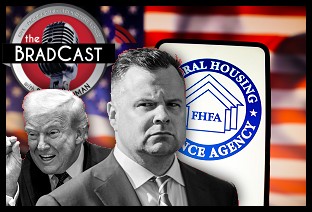 Trump's 'Cook'ed-Up Mortgage Fraud Claims: 'BradCast' 9/3/25
Trump's 'Cook'ed-Up Mortgage Fraud Claims: 'BradCast' 9/3/25 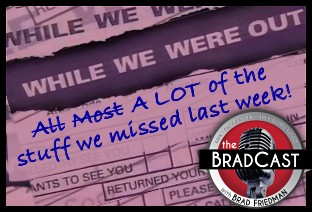 While We Were Out:
While We Were Out: 'Green News Report' 9/2/25
'Green News Report' 9/2/25
 Sunday 'Shots and Prayers' Toons
Sunday 'Shots and Prayers' Toons Cynical Hypocrisy Behind Right-Wing Opposition To CA's 'Election Rigging Response Act'
Cynical Hypocrisy Behind Right-Wing Opposition To CA's 'Election Rigging Response Act'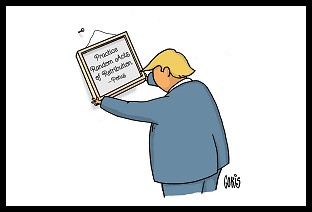 Sunday 'Random Acts of' Toons
Sunday 'Random Acts of' Toons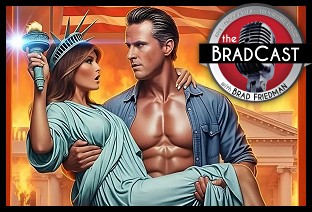 From CA's 'Nuclear Deterrence' Map to Newsom's Trolling to Trump's 'Fascist Theatre' and Beyond: 'BradCast' 8/21/25
From CA's 'Nuclear Deterrence' Map to Newsom's Trolling to Trump's 'Fascist Theatre' and Beyond: 'BradCast' 8/21/25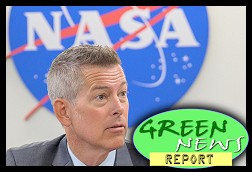 'Green News Report' 8/21/25
'Green News Report' 8/21/25 'Americanism' and Trump's 'Stalinesque' Plot to Whitewash History: 'BradCast' 8/20/25
'Americanism' and Trump's 'Stalinesque' Plot to Whitewash History: 'BradCast' 8/20/25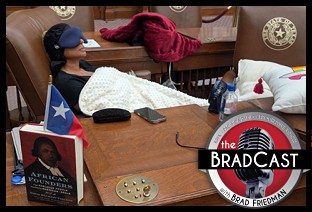 Texas GOP Imprisons Dem State Lawmaker in State House Chamber: 'BradCast' 8/19/25
Texas GOP Imprisons Dem State Lawmaker in State House Chamber: 'BradCast' 8/19/25 'Green News Report' 8/19/25
'Green News Report' 8/19/25 Trump, Nazis and Trump's Nazified Elections: 'BradCast' 8/18/25
Trump, Nazis and Trump's Nazified Elections: 'BradCast' 8/18/25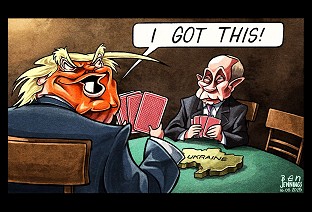 Sunday '
Sunday '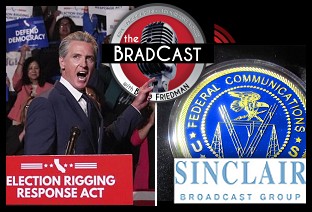 Newsom's 'Election Rigging Response Act'; FCC's License Renewal for Sock-Puppeting Sinclair: 'BradCast' 8/14/25
Newsom's 'Election Rigging Response Act'; FCC's License Renewal for Sock-Puppeting Sinclair: 'BradCast' 8/14/25 'Green News Report' 8/14/25
'Green News Report' 8/14/25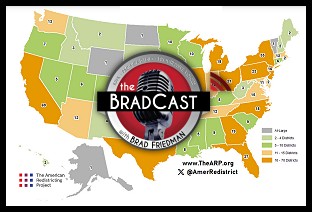 140 New House Reps?: Moving Beyond the Gerrymandering Wars: 'BradCast' 8/13/25
140 New House Reps?: Moving Beyond the Gerrymandering Wars: 'BradCast' 8/13/25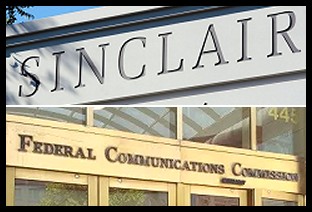 FCC Renews Sinclair Licenses Despite Complaint from Petitioner Who Died
FCC Renews Sinclair Licenses Despite Complaint from Petitioner Who Died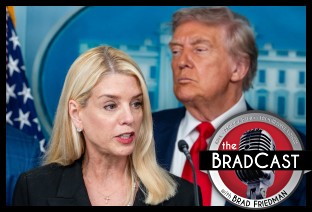 It's Not About the Rule of Law, It's About Authoritarian Control: 'BradCast' 8/12/25
It's Not About the Rule of Law, It's About Authoritarian Control: 'BradCast' 8/12/25 After Vaccine Cancels, CDC Shooting, Former Officials Want RFK Out: 'BradCast' 8/11/25
After Vaccine Cancels, CDC Shooting, Former Officials Want RFK Out: 'BradCast' 8/11/25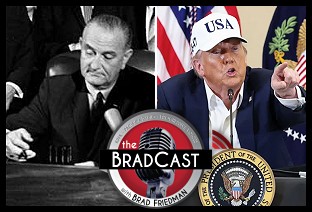 Trump Wars Against Greem Energy, Democracy on VRA's 60th: 'BradCast' 8/7
Trump Wars Against Greem Energy, Democracy on VRA's 60th: 'BradCast' 8/7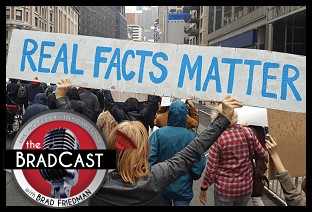 Media Conglomerates Continue Trump Capitulation: 'BradCast' 8/6/25
Media Conglomerates Continue Trump Capitulation: 'BradCast' 8/6/25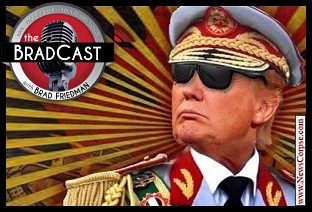 Banana Republican: Trump Shoots the Labor Statistics Messenger: 'BradCast' 8/5/25
Banana Republican: Trump Shoots the Labor Statistics Messenger: 'BradCast' 8/5/25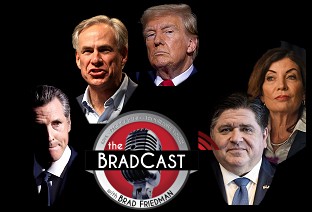 All's Fair in Love, War and, Apparently, Part-isan Gerrymandering: 'BradCast' 8/4/25
All's Fair in Love, War and, Apparently, Part-isan Gerrymandering: 'BradCast' 8/4/25
 VA GOP VOTER REG FRAUDSTER OFF HOOK
VA GOP VOTER REG FRAUDSTER OFF HOOK Criminal GOP Voter Registration Fraud Probe Expanding in VA
Criminal GOP Voter Registration Fraud Probe Expanding in VA DOJ PROBE SOUGHT AFTER VA ARREST
DOJ PROBE SOUGHT AFTER VA ARREST Arrest in VA: GOP Voter Reg Scandal Widens
Arrest in VA: GOP Voter Reg Scandal Widens ALL TOGETHER: ROVE, SPROUL, KOCHS, RNC
ALL TOGETHER: ROVE, SPROUL, KOCHS, RNC LATimes: RNC's 'Fired' Sproul Working for Repubs in 'as Many as 30 States'
LATimes: RNC's 'Fired' Sproul Working for Repubs in 'as Many as 30 States' 'Fired' Sproul Group 'Cloned', Still Working for Republicans in At Least 10 States
'Fired' Sproul Group 'Cloned', Still Working for Republicans in At Least 10 States FINALLY: FOX ON GOP REG FRAUD SCANDAL
FINALLY: FOX ON GOP REG FRAUD SCANDAL COLORADO FOLLOWS FLORIDA WITH GOP CRIMINAL INVESTIGATION
COLORADO FOLLOWS FLORIDA WITH GOP CRIMINAL INVESTIGATION CRIMINAL PROBE LAUNCHED INTO GOP VOTER REGISTRATION FRAUD SCANDAL IN FL
CRIMINAL PROBE LAUNCHED INTO GOP VOTER REGISTRATION FRAUD SCANDAL IN FL Brad Breaks PA Photo ID & GOP Registration Fraud Scandal News on Hartmann TV
Brad Breaks PA Photo ID & GOP Registration Fraud Scandal News on Hartmann TV  CAUGHT ON TAPE: COORDINATED NATIONWIDE GOP VOTER REG SCAM
CAUGHT ON TAPE: COORDINATED NATIONWIDE GOP VOTER REG SCAM CRIMINAL ELECTION FRAUD COMPLAINT FILED AGAINST GOP 'FRAUD' FIRM
CRIMINAL ELECTION FRAUD COMPLAINT FILED AGAINST GOP 'FRAUD' FIRM RICK SCOTT GETS ROLLED IN GOP REGISTRATION FRAUD SCANDAL
RICK SCOTT GETS ROLLED IN GOP REGISTRATION FRAUD SCANDAL VIDEO: Brad Breaks GOP Reg Fraud Scandal on Hartmann TV
VIDEO: Brad Breaks GOP Reg Fraud Scandal on Hartmann TV RNC FIRES NATIONAL VOTER REGISTRATION FIRM FOR FRAUD
RNC FIRES NATIONAL VOTER REGISTRATION FIRM FOR FRAUD EXCLUSIVE: Intvw w/ FL Official Who First Discovered GOP Reg Fraud
EXCLUSIVE: Intvw w/ FL Official Who First Discovered GOP Reg Fraud GOP REGISTRATION FRAUD FOUND IN FL
GOP REGISTRATION FRAUD FOUND IN FL

































